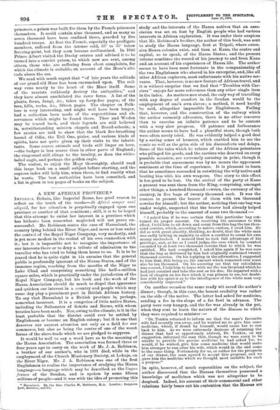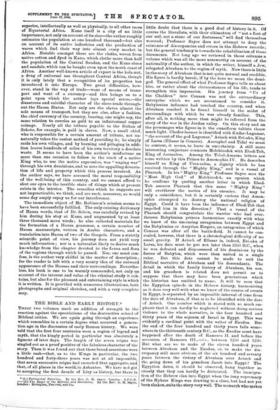A NEW AFRICAN PROVINCE.*
IMPEltIkl, Britain, like Imperial Rome, has good reason to reflect on the truth of the words—Ab Africa semper novi aliquid, for her attention is perpetually engaged upon one province or another of that continent ; still, it is to be hoped that this attempt to enlist her interest in a province which has hitherto been somewhat neglected will not prove un- successful. Mr. Robinson states the case of Hansaland, the country lying behind the River Niger, and more or less under the control of the Royal Niger Company, very modestly, and is yet more modest in the recital of his own connection with it; but it is impossible not to recognise the importance of our interests there or to deny a tribute of admiration to the traveller who has tried to bring them home to us. It is to be feared that he is quite right in his surmise that the general public is profoundly ignorant of the Hausa States, and of the immense region, reaching from the mouths of the Niger to Lake Chad and comprising something like half-a-million square miles, which is practically under the jurisdiction of the Royal Niger Company, but his book and the work of the Hansa Association should do much to dispel that ignorance and quicken our interest in a country and people which may some day play a prominent part in British African history. To say that Hansaland is a British province is, perhaps, somewhat incorrect. It is a congeries of little native States, including the Sultanates of Sokoto and Bornu, with whom treaties have been made. Nor, owing to the climate, is it in the least probable that the district could ever be settled by Englishmen or become an English colony; but it is one that deserves our earnest attention not only as a field for our commerce, but also as being the centre of one of the worst forms of the slave-trade which we are pledged to suppress.
It would be well to say a word here as to the meaning of the Hausa Association. The association was formed three or four years ago to carry on the work of Mr. J. A. Robinson, a brother of our author's, who in 1891 died, while in the employment of the Church Missionary Society, at Lokaja, on the River Niger. Mr. J. A. Robinson was one of the first Englishmen to realise the importance of studying the Hausa language—a language which may be described as the lingua franca of the Soudan, and is spoken by some fifteen millions of people—and it was with the idea of promoting this
• Hausaland. By the Rev. Charles H, Robinson, M.A. London: Sampson 1.ow, Marston. and Co.
study and the interests of the Hansa natives that an asso- ciation was set on foot by English people who had various interests in African exploration. It was under their auspices that Mr. Robinson's brother, the author of this book, was sent to study the Hausa language, first at Tripoli, where exten- sive Hansa colonies exist, and then at Kano, the centre and capital, so to speak, of the Hansa States ; and the present volume combines the record of his journey to and from Kano and an account of his experiences of Hausa life. The author seems to have been most fortunate in the companionship of the two Englishmen who shared in his enterprise, and, like all other African explorers, most unfortunate with his native ser- vants. That, however, is no new feature of African travel, and it is without surprise that we find that "Troubles with Car- riers" enjoys far more references than any other single item in the index. As matters now stand, the only way of travelling with any degree of comfort in the Soudan would be the employment of one's own slaves ; a method, it need hardly be said, altogether impossible for Englishmen. Failing that, however, and the construction of the railway which the author earnestly advocates, there is no other resource than to exercise an infinite patience and to be content with a very slow progress. Of patience and forbearance the author seems to have had a plentiful store, though both were often sorely tried. He was evidently helped a good deal by a saving sense of humour, which enabled him to see the comic as well as the grim side of his discomforts and delays. Some of the tales which he relates of the African potentates who pillaged his goods, and the carriers who deserted on every possible occasion, are extremely amusing in print, though it is probable that amusement was by no means the uppermost sentiment at the time of experience. It is pleasant to learn that he sometimes succeeded in outwitting the wily native and beating him with his own weapons. One story to this effect is too good to be lost. On the arrival of the party at Kano a present was sent them from the King, comprising, amongst other things, a hundred thousand cowries, the currency of the country, in five bags of twenty thousand each. It was the custom to present the bearer of them with ten thousand cowries for himself ; but the author, noticing that one bag was under weight, suspected that the bearer had already helped himself, probably to the amount of some two thousand :-
" I asked him if he was certain that this particular bag con- tained its proper amount. On receiving his assurance to this effect, I told him to sit down and count from this bag the ten thou- sand cowries, which, according to native custom, I owed him. He did so with great alacrity, thinking, no doubt, that the white man was sadly lacking in sagacity to allow a creditor to count his own money unchecked. I noticed that he took full advantage of his privilege, and, so far as I could judge, the sum which he counted exceeded by at least two thousand cowries that to which he was entitled. His task completed, I asked him again if he was sure that the bag as delivered by him had originally contained twenty thousand cowries. On his replying in the affirmative, I suggested to him that, this being so, the amount which remained over must also be ten thousand. On his assuring me that my calculation was correct, I told him to leave with me the ten thousand which he had just counted and take the rest as his due. He departed with a look of chagrin on his face which it was piteous to see, but doubt- less with his opinicn as to the intelligence of the white man very considerably improved."
On another occasion the same ready wit saved the author's dinner ; though, in this case, the honest credulity was rather on the side of the native. The latter had asked for medicine, sending a fee in the shape of a fat fowl in advance. The party were very hungry, and the fee was already in the pot, when they sent to learn the nature of the disease to which they were required to minister :—
" Dr. Tonkin returned to inform me that the man's favourite wife had recently run away, and he wanted me to give him some medicine, which, if drank by himself, would cause her to run back to him. As we were extremely desirous of retaining the dinner that had so opportunely arrived, Dr. Tonkin, on my suggestion, informed the man that, though we were sorry to be unable to provide the precise medicine he had asked for, we would, if he wished, give him some medicine that would make him stronger to run after his wife, which would in the end come to the same thing. Fortunately for us, or rather for the prospects of our dinner, the man agreed to accept this proposal, and we gave him the medicine which we thought most suitable for such a purpose."
In spite, however, of much superstition on the subject, the author discovered that the Hausas themselves possessed a knowledge of medicines which was not altogether to be despised. Indeed, his account of their commercial and other selatiQua fairly bears exit hie cohtehtiou that the Rums are superior, intellectually as well as physically, to all other races of Equatorial Africa. Kano itself is a city of no little importance, not only on account of its size—the author roughly estimates the population at one hundred thousand—but also on account of its native industries and the production of wares which find their way into almost every market in Africa. Notable amongst these are the cloths, woven from native cotton and dyed in Kano, which clothe more than half the population of the Central Soudan, and the Kano shoes and sandals, which can be bought even upon the north coast of Africa. Another well-known article of export is the kola-nut, a drug of universal use throughout Central Africa, though it is only lately that a recognition of its properties has introduced it into Europe. Two great difficulties, how- ever, stand in the way of trade—want of means of trans- port and want of a currency—and this brings us to a point upon which the author lays special stress,—the disastrous and suicidal character of the slave-trade through- out the Hausa States. Not only are the slaves almost the sole means of transport, but they are also, after a fashion, the chief currency of the country, bearing, one might say, the same relation to cowries as gold to an infinitesimal copper coinage. Nearly all the tribute payable to the Sultan of Sokoto, for example, is paid in slaves. Now, a small chief, who is responsible for a certain amount of tribute, not un- naturally takes the easiest method of providing it; he simply raids his own villages, and by burning and pillaging in addi- tion leaves hundreds of miles of his own territory a desolate waste. It seems to have been the author's misfortune on more than one occasion to follow in the track of a native King who, to use the native expression, was " waging war " through his own dominions, and to note the appalling devasta- tion of life and property which this process involved. As the author says, we have assumed the moral responsibility of the well-being of this country, and we cannot afford to shut our eyes to the terrible state of things which at present exists in the interior. The remedies which he suggests are not impracticable, we think, and are such, moreover, as would some day amply repay us for our interference.
The immediate object of Mr. Robinson's mission seems to have been successfully fulfilled. The only existing dictionary of Hansa words, that of Dr. Schon, was carefully revised by him during his stay at Kano, and augmented by at least three thousand more words ; he also collected materials for the formation of a Hausa. grammar, a certain number of Hausa manuscripts, written in Arabic characters, and a translation into Hansa of two of the Gospels. From a strictly scientific point of view, his journey does not yield very much information ; nor is a naturalist likely to derive much knowledge from the chapter devoted to the fauna and flora of the regions through which he passed. Nor, one must con- fess, is the author very skilful in the matter of description ; for the reader is left with a very scanty idea of the outward appearance of the Hausas and their surroundings. Neverthe- less, his book is one to be warmly commended, not only on account of the interest and value of the ethnical study it con- tains, but also for the pleasant and entertaining style in which it is written. It is provided with numerous illustrations, both photographs and original sketches, and with a very complete map.

















































 Previous page
Previous page